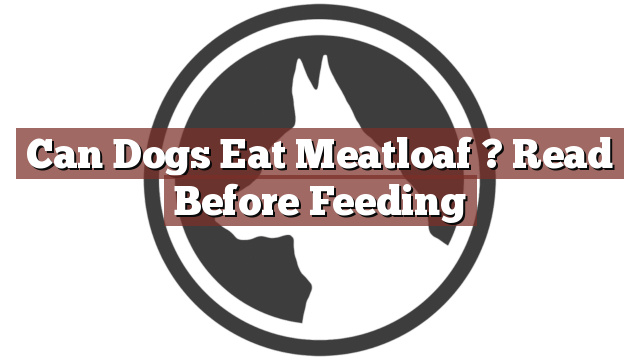Understanding Your Dog’s Dietary Needs
Dogs are carnivores by nature, and their bodies are designed to digest and thrive on a diet primarily consisting of meat. However, it is important to note that not all human foods are safe for dogs to consume. While dogs can benefit from some human foods, it is essential to understand their dietary needs and restrictions to ensure their overall health and well-being. A balanced and nutritious diet is crucial for dogs, providing them with the necessary vitamins, minerals, and nutrients to support their growth and maintain optimal health.
Can Dogs Eat Meatloaf? Read Before Feeding
Can dogs eat meatloaf? The answer is yes, but with caution. Meatloaf typically contains a variety of ingredients such as ground meat, breadcrumbs, onions, garlic, and various seasonings. While the key component, which is the meat, is generally safe for dogs to consume, other ingredients in meatloaf might not be suitable for their digestive system. Onions and garlic, for example, can be toxic to dogs and cause a condition called hemolytic anemia. Additionally, the breadcrumbs and seasonings used in meatloaf may contain ingredients that could upset a dog’s stomach or even pose a risk of food allergies.
Before feeding meatloaf to your dog, it is crucial to consider the specific ingredients used in the meatloaf recipe and their potential effects on your dog’s health. It is always best to consult with your veterinarian before introducing any new food into your dog’s diet to ensure their safety and well-being.
Pros and Cons of Feeding Meatloaf to Your Dog
Feeding your dog meatloaf can have both pros and cons, and it is essential to weigh the risks and benefits before making a decision. One potential benefit is that meatloaf can be a good source of protein for dogs, which is essential for muscle development and overall health. However, the cons must also be considered. The inclusion of ingredients like onions and garlic can be toxic to dogs and should be avoided. Additionally, the use of breadcrumbs and seasonings may lead to digestive issues or potential food allergies in some dogs.
If you do decide to feed meatloaf to your dog, it is crucial to make a homemade version that avoids harmful ingredients. Stick to a simple recipe that uses high-quality ground meat without any added seasonings, onions, or garlic. Baking the meatloaf without the breadcrumbs can also be a healthier alternative. Always remember to feed meatloaf as an occasional treat and not as a regular part of your dog’s diet.
In Conclusion: Make Informed Decisions for Your Dog’s Health
While dogs can eat meatloaf, it is important to take into account the specific ingredients used and their potential impact on your dog’s health. The answer to "can dogs eat meatloaf?" is yes, but with caution. The presence of onions, garlic, breadcrumbs, and seasonings can pose risks to your dog’s digestive system and overall well-being. If you are unsure about whether a particular food is safe for your dog to consume, it is always best to consult with your veterinarian. By making informed decisions about your dog’s dietary needs, you can ensure their long-term health and happiness.
Thank you for taking the time to read through our exploration of [page_title]. As every dog lover knows, our furry friends have unique dietary needs and responses, often varying from one canine to another. This is why it's paramount to approach any changes in their diet with caution and knowledge.
Before introducing any new treats or making alterations to your dog's diet based on our insights, it's crucial to consult with a veterinarian about [page_title]. Their expertise ensures that the choices you make are well-suited to your particular pet's health and well-being.
Even seemingly harmless foods can sometimes lead to allergic reactions or digestive issues, which is why monitoring your dog after introducing any new food item is essential.
The content provided here on [page_title] is crafted with care, thorough research, and a genuine love for dogs. Nevertheless, it serves as a general guideline and should not be considered a substitute for professional veterinary advice.
Always prioritize the expert insights of your veterinarian, and remember that the health and happiness of your furry companion come first.
May your journey with your pet continue to be filled with joy, love, and safe culinary adventures. Happy reading, and even happier snacking for your canine friend!

